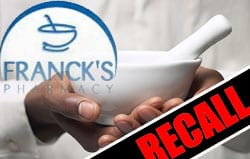
Franck’s Pharmacy just expanded its recall of compounded drugs, the U.S. Food & Drug Administration (FDA) just announced. Compounding involves mixing drugs using bulk ingredients, typically when patients are allergic to inactive ingredients in medicines approved by the FDA or when a different dose or delivery form (cream, powder, injectable) is needed and cannot be […]
 Franck’s Pharmacy just expanded its recall of compounded drugs, the U.S. Food & Drug Administration (FDA) just announced.
Franck’s Pharmacy just expanded its recall of compounded drugs, the U.S. Food & Drug Administration (FDA) just announced.
Compounding involves mixing drugs using bulk ingredients, typically when patients are allergic to inactive ingredients in medicines approved by the FDA or when a different dose or delivery form (cream, powder, injectable) is needed and cannot be commercially filled, said the AP. Pharmacies are able to work outside of the statutory drug approval process by creating drugs via pharmacy compounding.
The FDA is notifying physicians and medical care organizations who ordered compounded products sold as a sterile preparation by Franck’s Compounding Pharmacy of Ocala, Florida, of this recall. The recall involves all sterile products sold by Franck’s since November 2011 and has been implemented for the potential of a lack of sterility. An active investigation of this matter by the U.S. Centers for Disease Control & Prevention and the FDA is ongoing.
In March 2012, the FDA received reports of fungal endophthalmitis (eye infections) in patients given Brilliant Blue G (BBG) supplied by Franck’s Pharmacy during eye surgeries. Clinicians in a number of states reported the adverse events. In April 2012, the FDA received reports of eye infections in patients given injections of Franck’s drug products containing triamcinolone during eye surgery.
The FDA now warns that any product received from Franck’s since November 2011 not be used and that customers and physicians follow the instructions provided by Franck’s. The FDA also recommends that any adverse events suspected to be associated with use of the products be reported to FDA.
The FDA previously tested unopened bottles and unused syringes of the dye collected from Franck’s Compounding Lab. The agency discovered multiple bacterial and fungal species and announced that Franck’s was linked to a multi-state outbreak of a rare and serious fungal eye infection, confirming 33 cases of a rare fungal eye infection that spanned seven states. At least 23 people suffered vision loss and 24 required repeat surgery, according to a prior The Associated Press (AP) report that cited CDC figures.
Officials at Franck’s previously issued a statement indicating that they conducted a thorough investigation, tracing the contamination to a dye used in ocular triamcinolone injections and formulas containing that drug. Franck’s stated it resolved the issue and implemented changes that included hiring a new pharmacist to oversee quality assurance. That pharmacist, Jim Kilbride, RPh, wrote to the FDA and physicians stating that Franck’s recently experienced a fungal issue with one lot of triamcinolone acetonide P.F. 80mg/ml and issued a recall that involved five physicians and eight prescriptions. The letter also discussed another recall of triamcinolone acetonide P.F. 80mg/ml and stated that no adverse events were reported related to that lot, which involved four physicians and five prescriptions.
As we’ve written, Franck’s was the pharmacy responsible for mixing supplements that caused the 2009 deaths of 21 elite polo horses. Franck’s acknowledged that it used excess selenium in a veterinarian-prescribed supplement mix; the horses’ owners have since filed a lawsuit.
The FDA also previously accused Franck’s of illegally developing copies of similar drugs, of creating so-called “brews” outside of federal guidelines, and of compounding animal products from drugs not approved for use in the U.S. Franck’s was warned in 2005 and, again, in 2009, for illegal animal drug compounding. In 2011, a federal court disagreed, finding that the FDA had no jurisdiction over the established pharmaceutical practice of filling veterinary prescriptions for animals via compounding from bulk substances.


